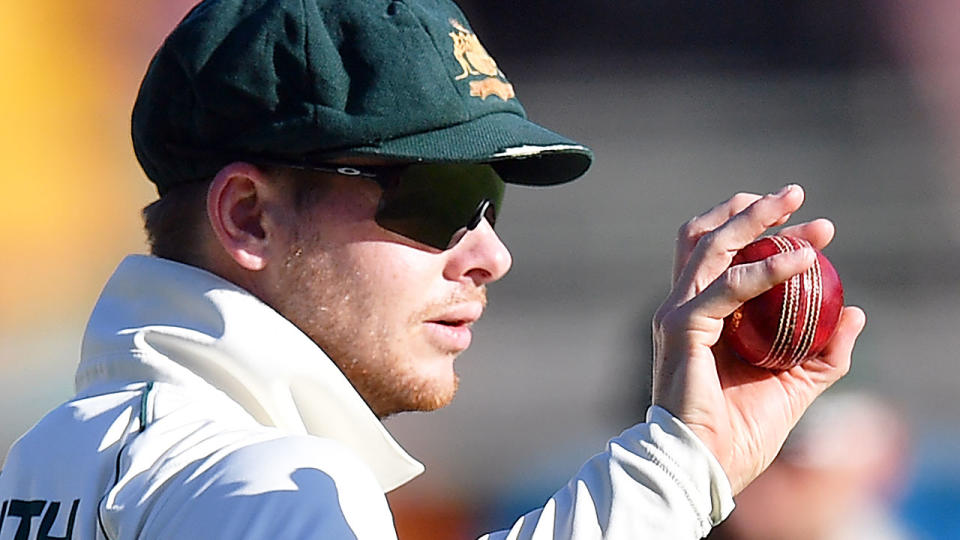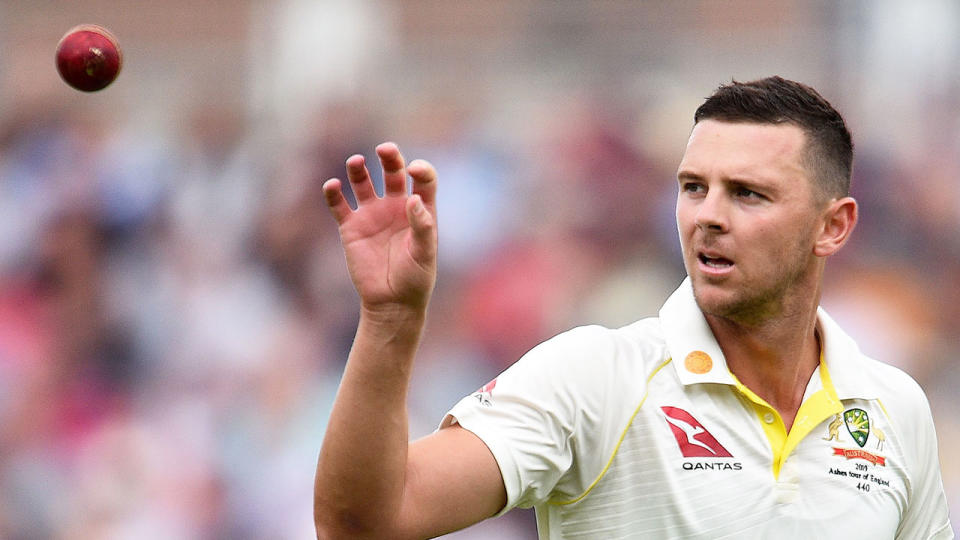Why cricket may be forced to legalise ball-tampering

The COVID-19 pandemic could force cricket officials into making a massive concession around ball-tampering.
As current rules for the sport state, the use of artificial substances to polish the cricket ball are prohibited.
SPECIAL SUMMER: Australia's stunning plan to play five-Test India series at one ground
'NO IDEA': David Warner roasted over horrendous social media video
However, with the onset of the coronavirus crisis and the need for strict health and safety protocols to be introduced when the sport resumes, that could all change.
Shining one side of the cricket ball - by applying saliva to the ball and rubbing it against clothes - is a fundamental part of the game.
The practice is crucial for fast bowlers in order to extract swing from the ball and make it more difficult for batsmen to face.
The obvious problem lies with the fact that multiple pairs of hands are touching the same ball that multiple samples of saliva have been applied to.
In the current virus climate, that practice simply isn't feasible.
ESPN Cricinfo reports that the issue is one law-makers are set to discuss before cricket can resume, with officials seemingly open to ideas that would have previously been deemed off the table.
The report states that allowing the "use of an agreed artificial substance to polish the ball under the supervision of the umpires" will be considered.
Under the current laws of the game, this would be considered ball-tampering but desperate times call for desperate measures.
The International Cricket Council (ICC) and the MCC's world cricket committee are expected to discuss the idea in late May or June.
When asked recently about not being able to shine the ball using saliva, Aussie Test bowler Josh Hazlewood said it would present an enormous challenge.
"I think the white ball would be fine, [but] Test cricket would be very hard," Hazlewood said.
"Bowlers rely on any sort of sideways movement in the air.
"If you didn't maintain the ball at all for 80 overs it would be quite easy to bat after that initial shine has gone.

"Whether you use saliva or sweat, maybe one person can do it. I'm not sure. It's something that will have to be talked about when we get back out there and hopefully come up with a solution."
Aussie Test bowling legend Jason Gillespie says the practice of spitting on a cricket ball is an issue around hygiene that should have been looked at long ago.
"I don't think anything is off the table," he told ABC Grandstand.
"It could be a point where at the end of each over, the umpires allow the players to shine the ball in front of them but you can only do it then. I don't have an answer to that but it certainly will be a conversation that will be had. If you think about it, it (spitting on the ball) is pretty gross."
India great Tendulkar predicts big changes
Sachin Tendulkar believes shining the ball may become a thing of the past when cricket resumes after the coronavirus outbreak.
With increased focus on social distancing and personal hygiene to contain the spread of the virus, the sport stares at a changing landscape.
"Shining the ball will change I think," Tendulkar told Reuters.
"Everyone will be conscious of maintaining social distancing, giving high-fives to each other and hugging after celebrating the fall of a wicket.
"I don't think those things are going to happen. It may happen instinctively but consciously players would want to make sure that they follow certain norms.
"During this period personal hygiene has been at the forefront."
Cricket like all other sport has come to a grinding halt as countries closed borders and enforced lockdowns to fight the virus that has infected more than 2.66 million people globally and killed more than 186,000.
Australia, South Africa and England have been among many who have been forced to postpone cricket tours to other countries while the cash-rich Indian Premier League Twenty20 tournament has been indefinitely suspended.
With several bilateral series being wiped out, the new World Test Championship (WTC) is in doubt with its final between the top two sides scheduled in June next year at Lord's.
The nine top-ranked sides are scheduled play three series each at home and away to determine the finalists and Tendulkar feels everyone should get a fair chance.
"I would like to believe that some tours are getting postponed rather than being called off," he said.
"The whole world has come to a standstill, it applies to all cricket playing nations. The whole calendar can be moved forward a little bit without altering too many things.
"I know the timings of the cricket season are different in different continents and that needs a closer look at."
Australia is scheduled to host the Twenty20 World Cup starting from October but Tendulkar feels it will be impossible to predict the fate of the tournament at this stage.
"It's not just about Australia, it's also about making sure that the rest of the teams are also feeling safe enough to travel there," he said.
with AAP

